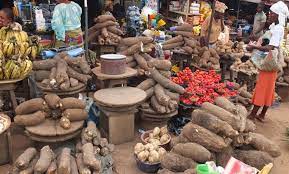As food inflation bites hard, the federal and sub-national governments should take measures to ameliorate the sufferings of the citizens by regulating the prices of food items and essential commodities as well as establishing a National food Bank that would serve as a boost against shortage of food supply and act as price control. Recently the UN listed Nigeria amongst 18 countries in the world to experience acute food insecurity and the government must take immediate measures to avert this.
This becomes necessary because there seems to be no control over how prices of food items soar uncontrollably daily without any prediction of its stabilization. One may be forced to think that the producers of these commodities take advantage of the free fall of the naira against the dollar to fix prices of food and other commodities arbitrarily without considering the poor bargaining power of the citizens. Farmers and producers of these commodities had also blamed the high cost of raw materials, operating cost, transportation cost, increase in fuel, diesel and insecurity as reasons for the increase in the prices of food items and essential commodities. These might be genuine reasons but these reasons can also be taken out of proportion if the government does not enforce some levels of control.
While the Tinubu administration grapples with possible measures to address food inflation in Nigeria, there is a need for it to also review past efforts that have been introduced by successive governments that failed to meet the desired expectations. Recall that President Muhammad Buhari, in a bid to encourage local production of rice banned the importation of rice and also provided some levels of incentives to farmers to increase rice production in Nigeria, the policy led to the increase of rice farmers but it did not succeed in bringing down the prices of rice. It is believed that such a policy failed to meet the expectations of the government because the government did not take advantage of the incentives it provided to farmers to regulate the final price of rice
The Tinubu administration also plans to remove VAT on food items and some other essential commodities, this is an applaudable move, it should however be tailored towards bringing down the prices of such commodities as such government must enforce some level of regulation in the final prices of those commodities in the market. There is no doubt that the government has also intervened recently to prevent the scarcity of food and bring down its price by giving directives for the release of millet, grains and rice from the national food reserves unfortunately such gestures did not stop the continuous increase in the prices of food items in the market simply because there was no price regulation from government on what should be the final cost of food items.
In an economic emergency being experienced by Nigeria, stringent measures must be taken by the government to stabilize the market rather than relying on the commercialization of the market by producers who then hijack the forces of demand and supply.
On this note, the federal government should boost its national food reserves by establishing government-owned farms across the country. The farms should produce essential items like grains, millet, wheat, cassava and livestock and they should be located in each of the six geopolitical zones of the country. This would also require adequate storage and processing facilities to be located in those regions. It is expected that such an establishment would not only contribute to reducing unemployment it will also serve as a buffer stock for food supply in Nigeria. Such measures would also play a vital role in regulating the prices of these commodities in the market because producers would have to compete in line with the government’s price. It would also boost the revenue generation of the government.
While this is recommended, the FG should also provide incentives such as subsidies on fertilizers, modern farming equipment and soft loans to farmers. However, to avoid the pitfalls of the past, these incentives must be tied to government prices. This would serve as a price control measure. In other words, many of the farmers or investors that benefit from FG incentives should be subjected to the price control and regulation of the government on those commodities. The government would also need to set up a monitoring and enforcement task force to monitor compliance at the various markets.
The government must not also abdicate its responsibility of providing security to farmers in the rural areas. Flashpoints in various states and local governments where bandits and terrorists regularly terrorize farmers should be identified and the FG and state government must work harmoniously to secure those areas. Government must also put measures in place to tackle the effect of climate change on farm produce. Flood prevention and mitigation measures should be implemented in agro-communities.
Victor Emejuiwe,
Monitoring & Evaluation/Strategic Communication Manager,
Centre for Social Justice, Abuja
08068262366




